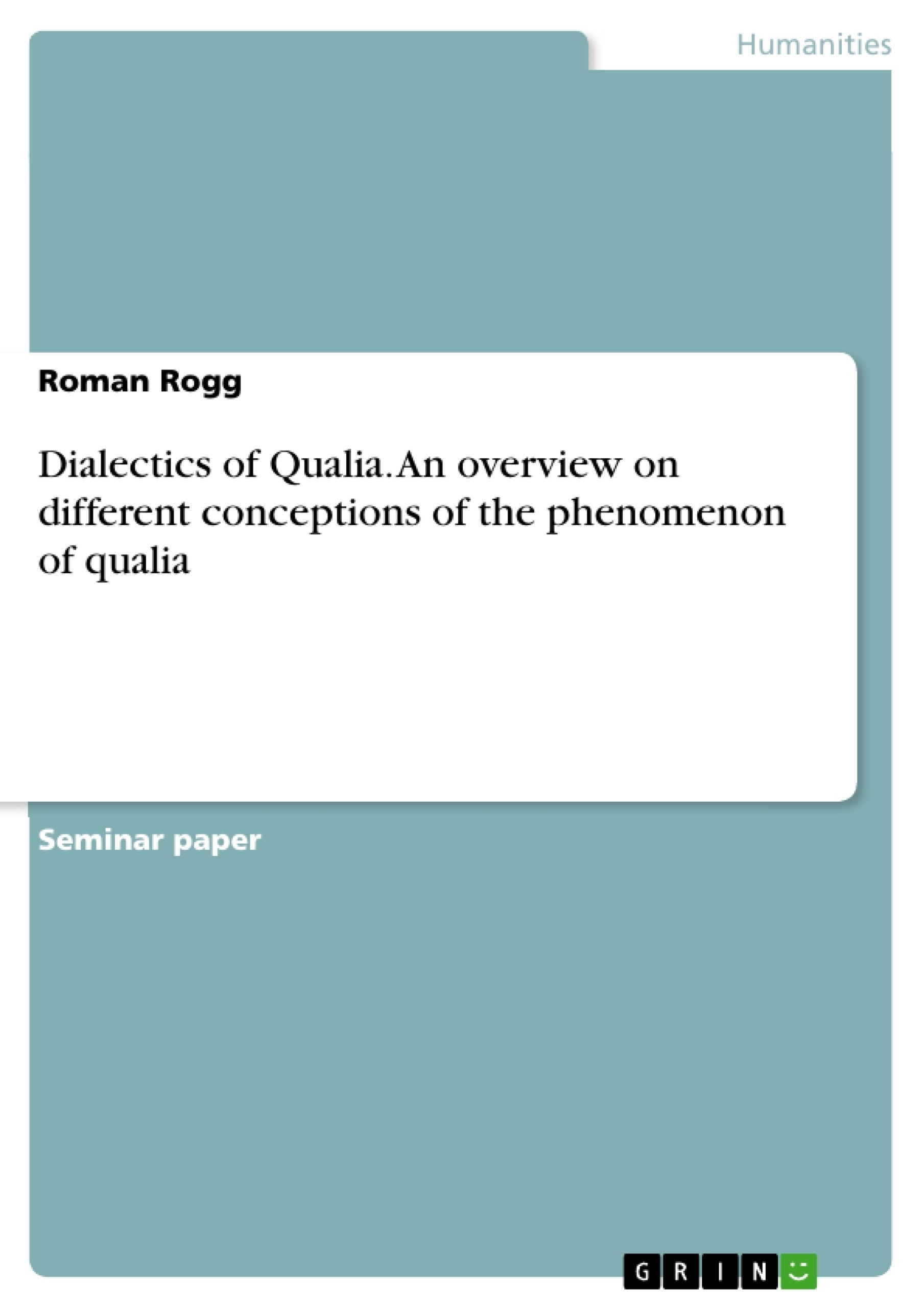It is the materialist's hope to rule out any perception of the human mind resisting to harmonize with a reductionist or eliminativist explanation. Therefore this paper aims to give an overview on different conceptions of the phenomenon of qualia, revealing some crucial problems for conceptually grasping the mind.
Inhaltsverzeichnis (Table of Contents)
- I. Introduction
- II. Preliminary Remarks: Qualia, Phenomenology and Language Games
- III. Introducing Qualia
- A. Qualia as Sense-Data
- B. David J. Chalmers
- 1. Mind the Gap
- 2. The Dual Life of the Mind
- 3. Qualia - Solely a Human Affair?
- C. Thomas Nagel
- 1. In Search for Objectivity in the Philosophy of Mind...
- 2. At a Loss for Words
- D. John R. Searle
- 1. Disparity in Subjectiveness
- 2. Shaping Qualia
- IV. Philosophical Foundations of Neuroscience
- A. The Objections
- 1. On the Conception of Qualia
- 2. On the Notion of 'How It Is Like ...'
- B. Remarks on Bennett/Hacker
- A. The Objections
- V. Conclusion
Zielsetzung und Themenschwerpunkte (Objectives and Key Themes)
This paper aims to introduce the reader to the concept of qualia, particularly within the context of the mind-body problem, and to explore the different theoretical perspectives on this complex issue. The paper examines the role of qualia in understanding human consciousness, particularly in relation to the nature of subjective experience and the challenge posed by the "zombie argument."
- The nature of qualia and their role in understanding phenomenal consciousness
- The mind-body problem and the philosophical debate surrounding qualia
- The limitations of language in expressing subjective experience
- The significance of qualia for the self-perception of conscious beings
- The interplay between philosophy and neuroscience in exploring the mind
Zusammenfassung der Kapitel (Chapter Summaries)
The paper begins by introducing the concept of qualia, defining them as the qualitative aspects of experience that accompany sensual perception and intentional acts. It explores the historical development of qualia, highlighting the sense-data theory and its limitations. The paper then presents the perspectives of three influential philosophers on qualia: David J. Chalmers, Thomas Nagel, and John R. Searle. Each philosopher offers unique insights into the nature of qualia, their relationship to consciousness, and the implications for our understanding of the mind. Chalmers focuses on the "hard problem" of consciousness and the need for a non-reductive explanation of qualia. Nagel emphasizes the subjective nature of experience and the limitations of language in expressing it. Searle explores the relationship between qualia, intentionality, and the physical world. The paper then turns to criticisms of the concept of qualia, examining the arguments of Maxwell Bennett and Peter Hacker, who question the validity of the concept and its contribution to philosophical understanding.
Schlüsselwörter (Keywords)
This paper explores key concepts related to qualia, including phenomenal consciousness, subjective experience, the mind-body problem, the zombie argument, intentional acts, and the limitations of language. It examines the views of influential philosophers like David J. Chalmers, Thomas Nagel, and John R. Searle, and analyzes critiques of the concept of qualia by Maxwell Bennett and Peter Hacker.
Frequently Asked Questions
What is the main focus of "Dialectics of Qualia"?
The paper provides an overview of different conceptions of qualia and explores the challenges they pose for a reductionist or materialist explanation of the human mind.
Which philosophers' perspectives on qualia are discussed?
The paper examines the views of David J. Chalmers, Thomas Nagel, and John R. Searle.
What is the "hard problem" of consciousness mentioned in the text?
Associated with David J. Chalmers, it refers to the challenge of providing a non-reductive explanation for how and why we have qualitative, subjective experiences (qualia).
How does Thomas Nagel contribute to the qualia debate?
Nagel emphasizes the subjective nature of experience (the "what it is like" aspect) and the limitations of objective language in capturing it.
Who are the main critics of the qualia concept discussed in the paper?
Maxwell Bennett and Peter Hacker are presented as critics who question the validity of the qualia concept from the perspective of philosophical foundations of neuroscience.
- Quote paper
- Roman Rogg (Author), 2020, Dialectics of Qualia. An overview on different conceptions of the phenomenon of qualia, Munich, GRIN Verlag, https://www.grin.com/document/1137570



